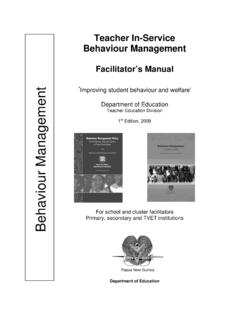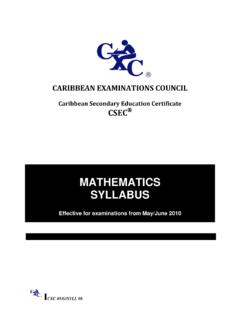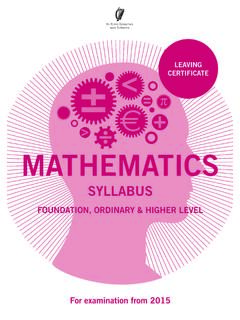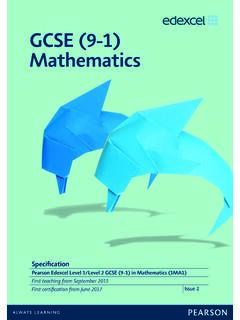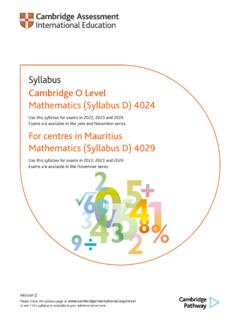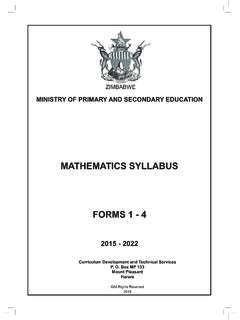Transcription of Mathematics Syllabus - Department of Education
1 Papua New GuineaDepartment of Education Syllabus FREE ISSUENOT FOR SALE Standards Based FREE ISSUE - NOT FOR SALE MathematicsGrades 6, 7 & 8 SyllabusMathematics Grades 6, 7 & 8 Standards BasedPapua New GuineaDepartment of EducationIssued free to schools by the Department of EducationPublished in 2018 by the Department of Education , Papua New Guinea. Copyright 2018, Department of Education , Papua New rights reserved. No part of this publication may be reproduced, stored in a retrieval system or transmitted by any form or by any means electronic, mechanical, photocopying, recording or otherwise without the prior written permission of the Design Layout by David Kuki GeregaISBN 978-9980-905-51-2 AcknowledgementsThe Grades 6, 7 and 8 Mathematics Syllabus was developed by the Curriculum Development Division of the Department of Education .
2 The Syllabus was coordinated by James Namari with assistance from the Subject Curriculum Group (SCG) members and the writing team. Special acknowledgement to Professor Masami ISODA from the University of Tsukuba, Japan for his technical expert advice on the development of this Syllabus Curriculum Panel (CP), Syllabus Advisory Committee (SAC) and Basic Education Board of Studies (BEBoS) committee members are also acknowledged for their recommendation and endorsement of this Syllabus . iiiii Grades 6, 7 & iv Secretary s 1 Aims and 2 Overarching Curriculum 3 Standards Based Curriculum 8 Rationale, Aim, Goal and the Guiding Principles of 9 Content 11 Grade 6 Strands and 7 Strands and 21 Grade 8 Strands and 27 Assessment, Monitoring, and 37 Mathematics Syllabus iiiAALA ssessment As LearningAFLA ssessment For LearningAOLA ssessment Of LearningBEBosBasic Educations Board of Studies CDDC urriculum Development DivisionCPCurriculum PanelDMRData and Mathematical RelationsGMTG eometry, Measurement and TransformationFFunctionsGFGeometrical FiguresIHDI ntegral Human DevelopmentMUDM aking Use of DataNANumber and AlgebraNDoENational Department of EducationNONumbers and OperationNOCN umber.
3 Operation and ComputationOBCO utcomes Based CurriculumOBEO utcomes Based EducationPAAP atterns and AlgebraQMQuantities and MeasurementSACS yllabus Advisory CommitteeSAPS tatistics and ProbabilitySBCS tandards Based CurriculumSBES tandards Based EducationSCGS ubject Curriculum GroupSTEAMS cience, Technology, Arts and Mathematics Acronyms v Grades 6, 7 & 8ivSecretary s MessageThe development of Grades 6, 7 and 8 Mathematics Syllabus is a direct response to the Governments directive through the Outcomes-Based Education (OBE) exit report, (Czuba 2013) to phase out Outcomes Based Curriculum and realign the curriculum using the Standards Based realignment of Mathematics curriculum from Outcome Based Curriculum (OBC) to Standards Based Curriculum (SBC) is aimed at improving the organisation of content and context of what the students will be studying at that level.
4 It is envisaged that by the end of grade 8, the students will acquire the necessary basic Mathematics knowledge, skills, attitude and values to help prepare them to progress to the next level of learning while at the same time aiming to strive and compete against 21st century competencies and demands locally and is therefore important for Mathematics Teachers to be creative, innovative and motivated when teaching Mathematics . The realigned Mathematics curriculum is focused to develop student s numeracy skills, utilizing the mathematical processes that will inspire the mind to think logically, abstractly, critically and creatively whilst nurturing the love for and of Mathematics to support every learner to reach their full potential. Mathematics literacy is critically important for Papua New Guinea to participate productively in an increasingly competitive knowledge and technological based are encouraged to use the Syllabus in conjunction with teacher guides and other relevant resources to generate creative teaching and learning activities to deliver the Mathematics commend and approve this Standards Based Mathematics Syllabus for grades 6, 7 and 8 to be used in all Schools throughout Papua New UKE W.
5 KOMBRA, PhD Secretary for Education Mathematics Syllabus v 21 Grades 6, 7 & 8 IntroductionThe introduction of Standards Based Education in Papua New Guinea is an important Government directive to raise performance competencies in all aspects of Education ; curriculum development, teacher training, student and teacher performance, monitoring, school management and leadership. The designing of courses in the curriculum have been done to raise standards in teaching and learning at all levels of schooling through reviewing, aligning, realigning and repositioning of the existing content in order to cater for the shift in the Mathematics curriculum is focused on helping students to acquire basic Mathematical understanding, knowledge, processes and manipulative skills in order for the learners to progressively improve their arithmetic skills over time thus improving the level of numeracy in Papua New grades 6, 7 and 8 Mathematics Syllabus makes explicit the mential knowledge, skills, attitudes and values that all students are expected to progressively learn and master before leaving each grade.
6 These are described in the Content Standards and benchmarks. They provide a reference point that will enable students to meet the expectation of the PNG national curriculum. Mathematics Syllabus 2 Aims and GoalsUltimate AimIntegral human development is the ultimate aim of Education in Papua New Guinea. integral in the sense that all aspects of a person are important; human in the sense that social relationships are basic; and development in the sense that every individual has the potential to grow in the knowledge, wisdom, understanding, skill and 1) Every person will be dynamically involved in the process of freeing himself or herself from every form of domination and oppression so that each individual will have the opportunity to develop as an integrated person in relationship with others.
7 This means that the national curriculum must integrate and maximise socialisation, participation, liberation and equality; 2) Awareness of human potential and the willingness to develop this potential so that each individual can solve his or her own problems, contribute to the common good of society and maintain, promote and improve learning and living; and 3) Awareness of the goodness and the dignity of every person. It calls for the promotion of self and mutual respect, a sense of self-worth and self-discipline and a sense of responsibility for one self and process of integral human development calls for a national curriculum, which helps individuals to: identify their basic human needs; analyse situations in terms of these needs; see these needs in the contexts of spiritual and social values of the community; and take responsible action in co-operation with others.
8 43 Grades 6, 7 & 8 Overarching Curriculum PrinciplesCurriculum principles identify, describe and focus attention on the important concerns that must be addressed when developing the curriculum at all levels of schooling. They are based on significant cultural, social and educational values and national curriculum should be relevant to the social, spiritual and resource development needs of a community. This can be achieved by integrating teaching and learning situations that reflect the knowledge, skills, attitudes and spiritual values needed for integral human development. A relevant national curriculum will prepare students for productive community living; integrate academic and practical Education ; and will provide ways to paid and unpaid people in Papua New Guinea work in the informal economy.
9 Students who leave at the end of grade 8, 10 or 12 will need to find work in the informal economy. These students, however, will not only need to be skilled to work in the informal economy, but they will also need to be prepared to work in the formal economy and undertake formal Education if there are opportunities. All students will need applied and academic skills and knowledge. All students will need to know how to adapt new technologies and knowledge appropriately to their national curriculum will enable teachers to support students learning by encouraging teaching in real-life contexts. This means relating the skills and knowledge of subjects to real life situations. For example, Mathematics can be used to study how to run a business, or appropriate technology can be applied to improve water supplies.
10 People from the community could also be brought into the classroom to help teach a topic and support students undertaking useful projects in the New Guinea is blessed and fortunate to have so many languages and cultures. The diversity of our cultures is the source of our knowledge, skills, attitudes and values. As a multicultural society, we must protect, promote and respect our many cultures and languages. There are many people from our own ethnic groupings and from other countries with their own cultures, living and working together in Papua New Guinea. This is the most multicultural country in the world. Therefore, we must ensure that we promote and share our cultures with the rest of the , Morals, and ValuesPapua New Guinea is striving to create a society in line with democratic liberal traditions.

